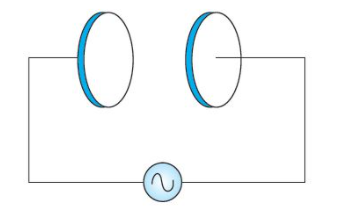Exercise from NCERT PHYSICS(HINGLISH) ELECTROMAGNETIC WAVES for Class 12
| Class 12 | PHYSICS |
| Chapter | ELECTROMAGNETIC WAVES |
| NCERT PHYSICS(HINGLISH) | Exercise |
| Medium | English |
| Academic Year | 2023-2024 |
Question 1
Fig. shows a capacitor made of two circular plates each of radius 12 cm and separated by 5.0 cm. The capacitor is being charged by an external source (not shown in the figure). The charging current is constant and equal to 0.15A.
(a) Calculate the capacitance and the rate of change of potential difference between the plates.
(b) Obtain the displacement current across the plates.
(c) Is Kirchhoff's first rule valid at each plate of the capacitor ? Explain.
 View Solution
View SolutionQuestion 2
A parallel plate capacitor made of circular plates each of radius R=6.0 cm has a capacitance C=100pF. The capacitor is connected to a 230VAC supply with a ( angular) frequency of 300rad/s
(a) What is the rms value of the conduction current ?
(b) Is the conduction current equal to the displacement current?
(c) Determine the amplitude of B at a point 3.0cm from the axis between the plates.
 .View Solution
.View SolutionQuestion 9
The terminology of different parts of the electromagnetic spectrum is given in the text. Use the formula E = h ν (for energy of a quantum of radiation: photon) and obtain the photon energy in units of eV for different parts of the electromagnetic spectrum. In what way are the different scales of photon energies that you obtain related to the sources of electromagnetic radiation?View SolutionQuestion 10
In a plane electromagnetic wave, the electric field oscillates sinusoidally at a frequency of 2.0×1010Hz and amplitude 48V−1m
(a) What is the wavelength of the wave?
(b) What is the amplitude of the oscillating magnetic field.
(c) Show that the average energy density of the field E equals the average energy density of the field B.[c=3×108ms−1].View SolutionQuestion 11
Suppose that the electric field part of an electromagnetic wave in vacuume is
E=3.1N/Ccos[(1.8rad/m)y+(5.4×108rad/s)t]ˆi
(a) What is the direction of propogation?
(b) What is the wavelength λ?
(c) What is the frequency v?
(d) What is the amplitude of the magnetic field part of the wave?
(e) Write an expression for the magnetic field part of the wave.View SolutionQuestion 14
Given below are some famous numbers associated with electromagnetic radiations in different contexts in physics. State the part of the electromagnetic spectrum to which each belongs. (a) 21 cm (wavelength emitted by atomic hydrogen in interstellar space). (b) 1057 MHz (frequency of radiation arising from two close energy levels in hydrogen, known as Lamb shift). (c) 2.7 K [temperature associated with the isotropic radiation filling all space-thought to be a relic of the ‘big-bang’ origin of the universe].
(d) 5890ˆA−5896ˆA (double lines of sodium]
(e) 14.4keV energy of a particular transition in .57Fe nucleus associated with a famour high resolution spectroscopic method (mossbauer spectroscopy). View SolutionQuestion 15
Answer the following questions: (a) Long distance radio broadcasts use short-wave bands. Why? (b) It is necessary to use satellites for long distance TV transmission. Why? (c) Optical and radiotelescopes are built on the ground but X-ray astronomy is possible only from satellites orbiting the earth. Why? (d) The small ozone layer on top of the stratosphere is crucial for human survival. Why? (e) If the earth did not have an atmosphere, would its average surface temperature be higher or lower than what it is now? (f) Some scientists have predicted that a global nuclear war on the earth would be followed by a severe ‘nuclear winter’ with a devastating effect on life on earth. What might be the basis of this prediction? Answer the following questions: (a) Long distance radio broadcasts use short-wave bands. Why? (b) It is necessary to use satellites for long distance TV transmission. Why? (c) Optical and radiotelescopes are built on the ground but X-ray astronomy is possible only from satellites orbiting the earth. Why? (d) The small ozone layer on top of the stratosphere is crucial for human survival. Why? (e) If the earth did not have an atmosphere, would its average surface temperature be higher or lower than what it is now? (f) Some scientists have predicted that a global nuclear war on the earth would be followed by a severe ‘nuclear winter’ with a devastating effect on life on earth. What might be the basis of this prediction?View Solution